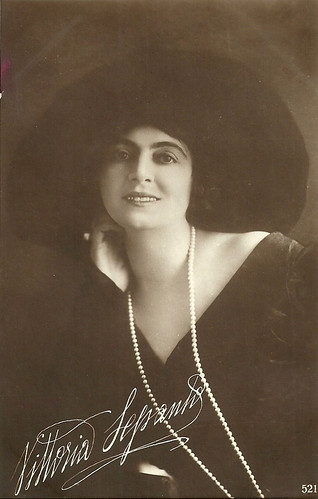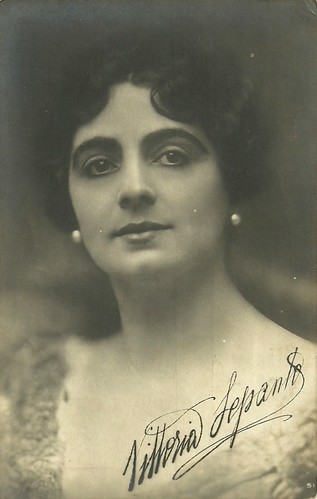Beautiful and intelligent actress Vittoria Lepanto (1885-1965) was active in the Italian silent cinema. She became one of the first film divas, but now she seems to be forgotten.

Italian postcard by Ed. A. Traldi, Milano, no. 521.

Italian postcard, no. 50. Collection: Didier Hanson.
Vittoria Lepanto was born as Victoria Clementina Proietti in Saracinesco in 1885. She was the fourth of five children of Fortunato and Virginia Proietti. When her father died, her mother sold the house and moved to Rome to work in a wealthy family. She placed her children in institutional care.
Vittoria's stage name was chosen by the author Gabriele D'Annunzio, who was probably inspired by the battle of Lepanto of 1571. From 1909 on she appeared in the silent cinema. Among her early films were the short Film d'Arte Italiana productions Carmen (Gerolamo Lo Savio, 1909) in which she played the title role opposite Dante Cappelli as Don José, and Otello/Othello (Ugo Falena, Gerolamo Lo Savio, 1909), in which she played Desdemona opposite Ferruccio Garavaglia as the Moor of Venice.
She also appeared in La signora dalle camelie/Camille (Gerolamo Lo Savio, 1909) with Lepanto as Marguerite Gauthier and Alberto Nepoti as Armand, based on Alexandre Dumas fils' classic stage play 'La dame aux camélias', which in its turn was the basis for Verdi's classic opera 'La Traviata'.
In the next years followed more leading roles in Film d'Arte Italiana productions such as Salomé (Ugo Falena, 1910) with Lepanto in the title role and with future film diva Francesca Bertini as supporting actress, Rigoletto (Gerolamo Lo Savio, 1910), Lucrezia Borgia (Ugo Falena, 1910) with Lepanto in the title role and Gustavo Serena as the man who first hates then loves her.
In the next years followed Marozia (Gerolamo Lo Savio, 1911) with Lepanto as a scheming princess in medieval Rome, and I carbonari/The Carbonari (Gustavo Serena, 1912) with again Francesca Bertini in a supporting part.

Italian postcard by Fotoclere, Torino, no. 51.
During the First World War, Vittoria Lepanto continued her career in the Italian silent cinema. Among her roles were Fiorella in L'avvenire in agguato/The Future in Ambush (Giulio Antamoro, 1916), and Berta Tregnier in L'ombra/The Shadow (Mario Caserini, 1917).
In 1918, she played the role of Elena Muti in the film Il piacere/The Pleasure (Amleto Palermi, 1918) opposite Enrico Roma as Andrea Sperelli. The plot of the film was based on the novel by Gabriele D'Annunzio. In this film, she was credited as Vittorina Lepanto.
Her later films included La signora delle perle/Camille (Gennaro Righelli, 1919), Per aver visto/The Villa Next Door (Enrico Roma, 1919), Israël (André Antoine, 1919) as the Duchessa di Crouchy, Il rosso e il nero/ The Red and the Black (Mario Bonnard, 1920) based on the novel by Stendhal, and L'amica/Her Friend (Mario Bonnard, 1920).
In the 1920s there was a crisis in the Italian film industry and Vittoria Lepanto retired from the cinema. Her final film was the drama L'amico/The Friend (Mario Bonnard, 1921), in which she co-starred with Mario Bonnard.
In 1964, Vittoria Lepanto died in Rome. She was 80.

Italian postcard by Fotocelere, Torino (Turin).

Italian postcard by Fotocelere, Torino (Turin).
Sources: Wikipedia (Italian), Sempre in Penombra (Italian) and IMDb.
This post was last updated on 17 March 2025.

Italian postcard by Ed. A. Traldi, Milano, no. 521.

Italian postcard, no. 50. Collection: Didier Hanson.
Film d'Arte Italiana
Vittoria Lepanto was born as Victoria Clementina Proietti in Saracinesco in 1885. She was the fourth of five children of Fortunato and Virginia Proietti. When her father died, her mother sold the house and moved to Rome to work in a wealthy family. She placed her children in institutional care.
Vittoria's stage name was chosen by the author Gabriele D'Annunzio, who was probably inspired by the battle of Lepanto of 1571. From 1909 on she appeared in the silent cinema. Among her early films were the short Film d'Arte Italiana productions Carmen (Gerolamo Lo Savio, 1909) in which she played the title role opposite Dante Cappelli as Don José, and Otello/Othello (Ugo Falena, Gerolamo Lo Savio, 1909), in which she played Desdemona opposite Ferruccio Garavaglia as the Moor of Venice.
She also appeared in La signora dalle camelie/Camille (Gerolamo Lo Savio, 1909) with Lepanto as Marguerite Gauthier and Alberto Nepoti as Armand, based on Alexandre Dumas fils' classic stage play 'La dame aux camélias', which in its turn was the basis for Verdi's classic opera 'La Traviata'.
In the next years followed more leading roles in Film d'Arte Italiana productions such as Salomé (Ugo Falena, 1910) with Lepanto in the title role and with future film diva Francesca Bertini as supporting actress, Rigoletto (Gerolamo Lo Savio, 1910), Lucrezia Borgia (Ugo Falena, 1910) with Lepanto in the title role and Gustavo Serena as the man who first hates then loves her.
In the next years followed Marozia (Gerolamo Lo Savio, 1911) with Lepanto as a scheming princess in medieval Rome, and I carbonari/The Carbonari (Gustavo Serena, 1912) with again Francesca Bertini in a supporting part.

Italian postcard by Fotoclere, Torino, no. 51.
Crisis in the Italian film industry
During the First World War, Vittoria Lepanto continued her career in the Italian silent cinema. Among her roles were Fiorella in L'avvenire in agguato/The Future in Ambush (Giulio Antamoro, 1916), and Berta Tregnier in L'ombra/The Shadow (Mario Caserini, 1917).
In 1918, she played the role of Elena Muti in the film Il piacere/The Pleasure (Amleto Palermi, 1918) opposite Enrico Roma as Andrea Sperelli. The plot of the film was based on the novel by Gabriele D'Annunzio. In this film, she was credited as Vittorina Lepanto.
Her later films included La signora delle perle/Camille (Gennaro Righelli, 1919), Per aver visto/The Villa Next Door (Enrico Roma, 1919), Israël (André Antoine, 1919) as the Duchessa di Crouchy, Il rosso e il nero/ The Red and the Black (Mario Bonnard, 1920) based on the novel by Stendhal, and L'amica/Her Friend (Mario Bonnard, 1920).
In the 1920s there was a crisis in the Italian film industry and Vittoria Lepanto retired from the cinema. Her final film was the drama L'amico/The Friend (Mario Bonnard, 1921), in which she co-starred with Mario Bonnard.
In 1964, Vittoria Lepanto died in Rome. She was 80.

Italian postcard by Fotocelere, Torino (Turin).

Italian postcard by Fotocelere, Torino (Turin).
Sources: Wikipedia (Italian), Sempre in Penombra (Italian) and IMDb.
This post was last updated on 17 March 2025.
No comments:
Post a Comment